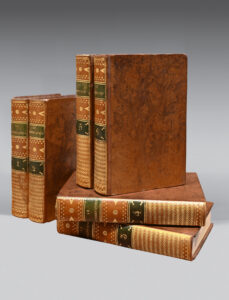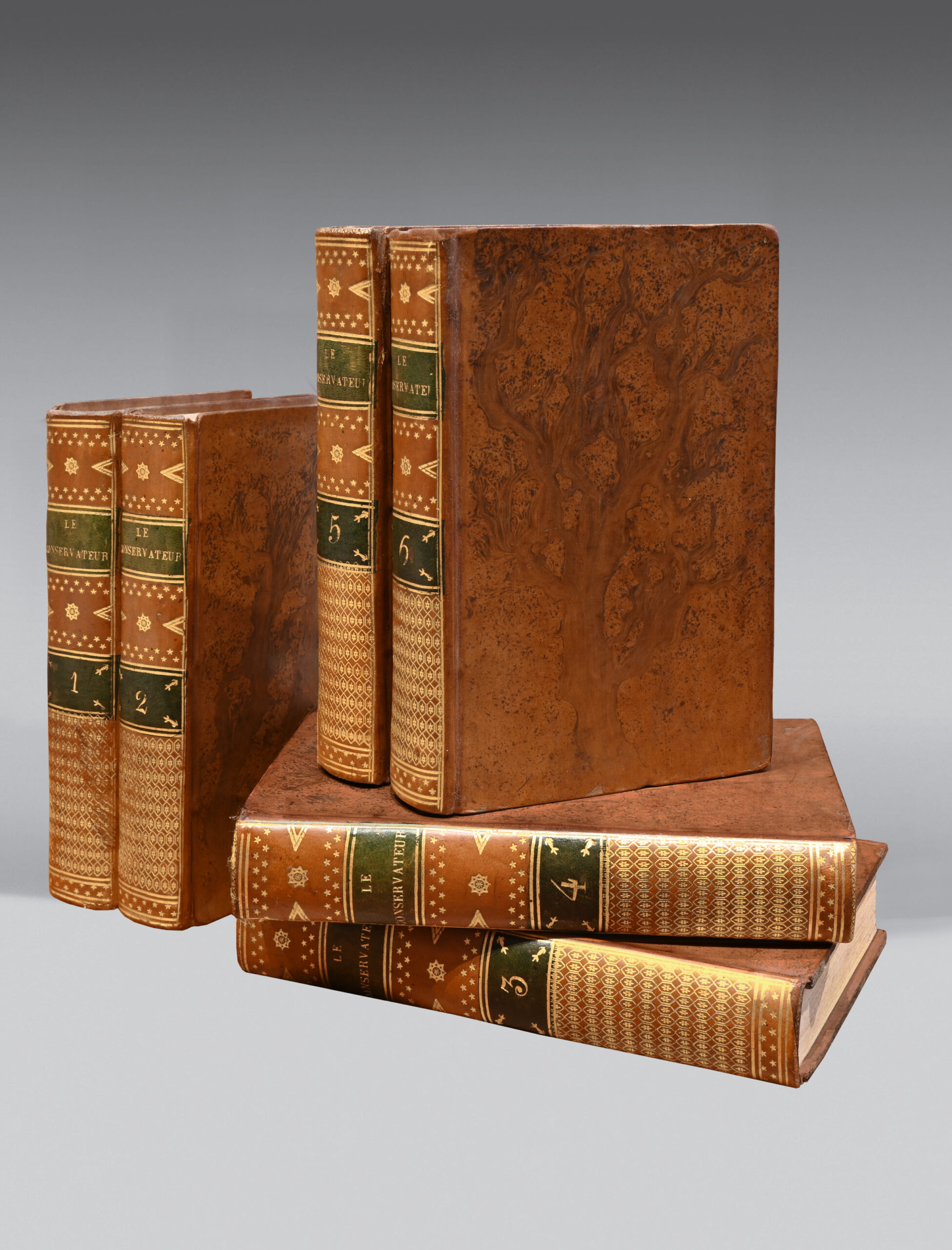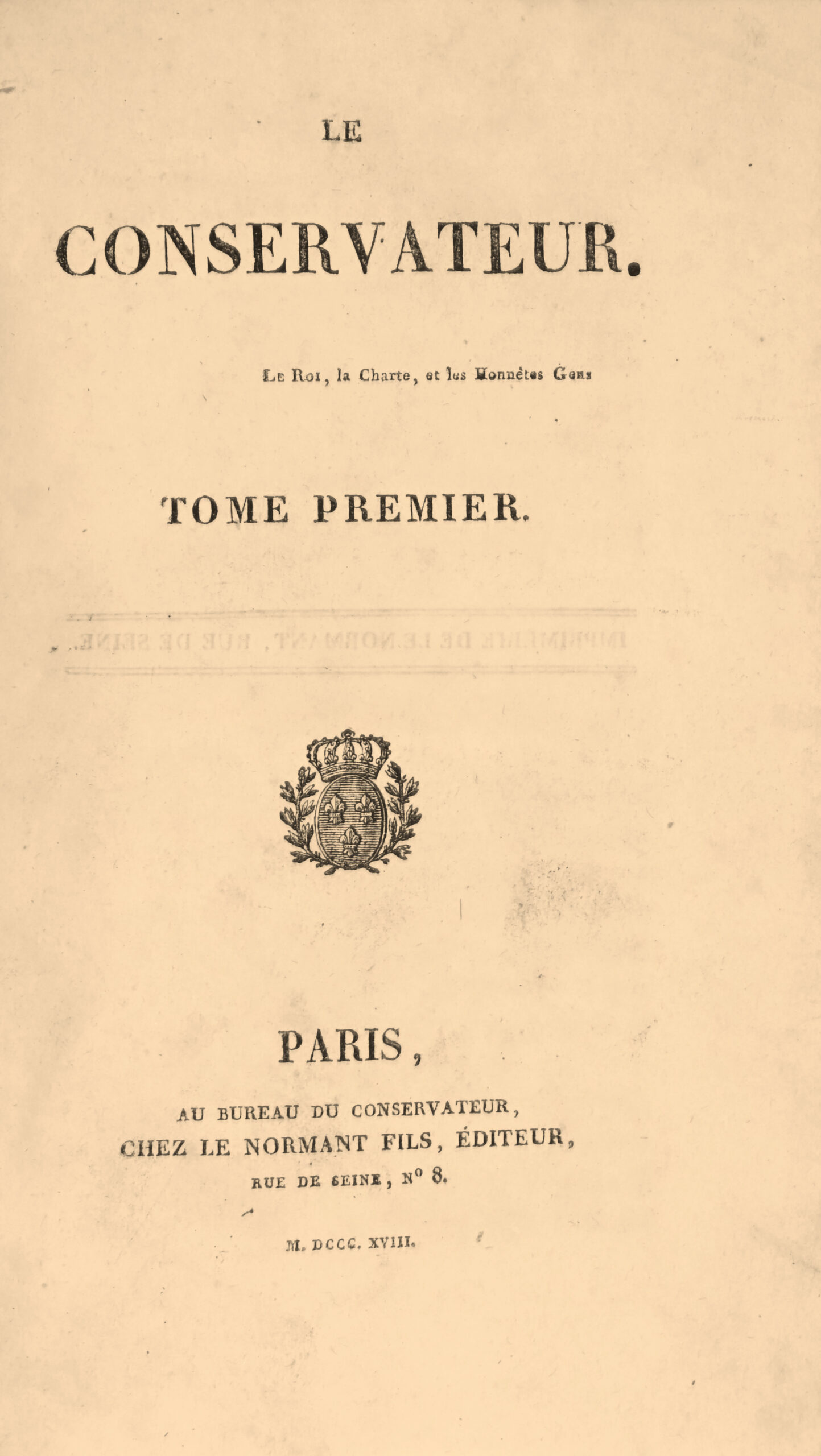Paris, Au bureau du Conservateur, chez le Normant Fils (Rue de Seine), 1818-1820.
6 volumes 8vo of 632, 656 (error of pagination between 93 and 113 – complete like this – in conformity with the other copies), 624, 640, 632 and 640 pages (tear in the margin of p. 31 without loss of text).
Full rooted sheepskin, finely decorated flat spines, green morocco lettering-pieces, top of hinges and two extremities of the spines rubbed. Contemporary binding.
200 x 123 mm.
A rare unique and complete issue of this ‘ultra-royalist’ periodical, of which Chateaubriand was the leader.
Faced with the success of the liberal newspaper La Minerve, the royalist party did not want to remain unarmed and its members therefore decided to create a newspaper which they called Le Conservateur.
This is a set complete of everything that was published of this ultra-royalist periodical directed by Chateaubriand and a few friends linked to the monarchical cause. A total of 78 issues printed from October 1818 to march 1820. The motto of this journal is printed in the foreword of each title page: ‘Le Roi, la Charte et les Honnêtes Gens’ (The King, the Charter and the Honest People).
Between October 1818 and March 1820, this organization gathered the best plums of the ultras party: the Cardinal de la Luzerne, the Abbé de Lamennais, the Duc de Fitz-James, the Marquis d’Herbouville, the Comte de Salaberry, the Viscounts de Bonald and de Castelbajac, Genoude, Berryer fils, and others,
The authors mainly denounced the policies of the government of Armand Emmanuel du Plessis de Richelieu and then that of Elie Decazes, who were accused of defending revolutionary interests that jeopardized the Charter of 1814.
In his Mémoires d’Outre-tombe, Chateaubriand considers that the “revolution operated by this journal was unusual: in France, it changed the majority in the Houses; abroad, it transformed the spirit of the cabinets”.
It met with great success not only in the press but also in public opinion, since it had a notable impact on the public.
The paper had a print run of three thousand copies for the first few issues, then fluctuated between seven thousand and eight thousand five hundred from November 1818 onwards.
It ceased publication when censorship was reinstated in February 1820 following the assassination of the Duc de Berry. This resolution was announced to subscribers in a letter from Chateaubriand at the end of the 78th and last issue.
“To sum up, it is in this justly famous collection, a hotbed of all the regrets, resentments and exaggerations of the ultras, that we must above all look for royalist politics during the eighteen months it lasted. When it was dissolved, some of its editors, led by Lamennais, founded Le Défenseur, a religious, political and literary journal. 1 March 1820-11 Oct. 1821. 6 vol. 8vo. This new paper became the ardent, passionate and, so to speak, official champion of Lamennais’ philosophy. Its contributors included Messrs de Bonald, Saint-Victor, Genoude, Cardinal de la Luzerne, Lamartine, etc.’ (Hatin, Bibliographie historique et critique de la presse périodique française etc., pp. 338-340).
“As for us, we fear nothing. Our principles are those of religion, order and justice: sooner or later we will triumph with these principles. Truth will always topple the edifice of error and lies. Wherever paganism had placed its false gods, heaven sent a destroyer; every pagan temple saw an armed Barbarian at its gates. Providence did not stop the torch and the lever until the unfaithful race had been changed: then a cross was raised on the monuments, and all was said.” (Chateaubriand, extract from Le Conservateur).
A fine copy in contemporary binding.



